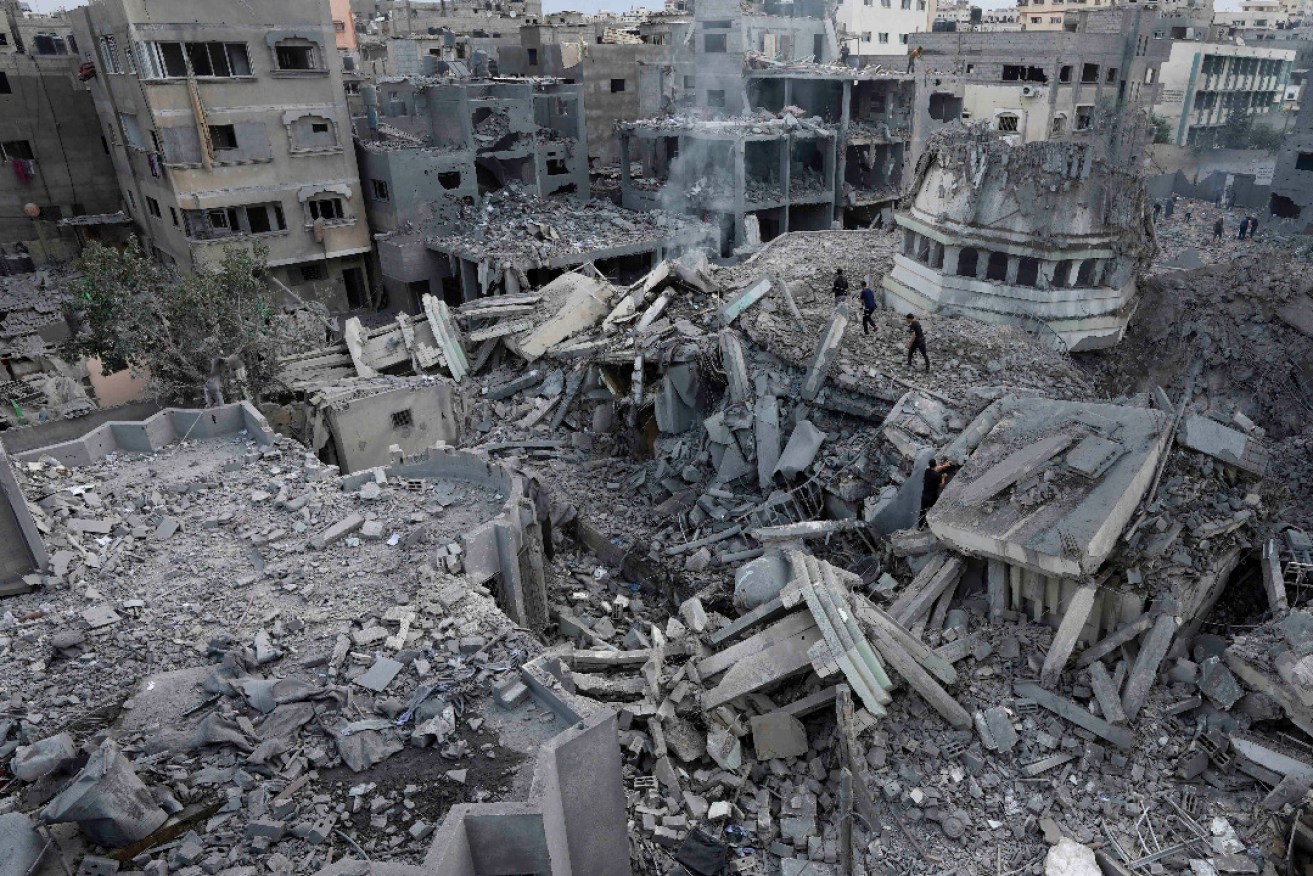Israel blockades Gaza as Hamas threatens to execute captives
The Israeli military says it has called up an unprecedented 300,000 reservists and is imposing a total blockade of the Gaza Strip in a sign it may be planning a ground assault in response to the devastating weekend attack by Hamas gunmen.

Israeli strikes have destroyed buildings in Gaza as officials said the area would pay a heavy price. Photo: EPA
After hours of intense bombardment by Israeli jets, Hamas, the Islamist movement which controls Gaza, said it would execute an Israeli captive if civilian houses were bombed.
Inside Israel, Palestinian fighters were still holed up in several locations, two days after they killed hundreds of Israelis and seized dozens of hostages in a raid that shattered Israel’s reputation of invincibility.
Israeli TV channels said the death toll from the Hamas attack had climbed to 900.
Gaza’s health ministry said at least 687 Palestinians have been killed and 3726 wounded in Israeli air strikes on the blockaded enclave since Saturday.
Hamas spokesman Abu Ubaida said the group had been acting in accordance with Islam by keeping the Israeli captives safe.
But in return for every Israeli bombing of a civilian house without warning, it would begin executing an Israeli civilian captive and broadcast it, he said.
Echoing Hamas, the Islamic Jihad armed wing – which said it was holding more than 30 Israeli captives – asked Israel to refrain from hitting civilians if they cared about the fate of Israelis in its custody.
In Gaza, Israel pressed on with its most intensive retaliatory strikes ever.
Defence Minister Yoav Gallant announced a tightened blockade, which would prevent even food and fuel from reaching the strip, home to 2.3 million people.
As night fell, the Israeli air strikes became more aggressive and witnesses said several Hamas security headquarters and ministries were hit.
The strikes destroyed some roads and houses.
Israel also bombed the headquarters of the private Palestinian Telecommunication Co, which could affect land phone, internet and mobile phone services.
As it rained, explosions and lightning lit the skies, and thunder mixed with the sound of the bombings.
In a further signal of Israel’s rapid shift to a war footing, a cabinet member from Prime Minister Benjamin Netanyahu’s Likud Party said it could set up a national unity government joined by opposition leaders within hours.
Netanyahu told mayors of southern towns hit by Saturday’s surprise assault that Israel’s response would “change the Middle East”.
At the Jabalia refugee camp in northern Gaza, men clambered on a pancaked building to pull an infant’s tiny body from the rubble, carrying it down through the crowd below amid still-smouldering remains of bombed buildings.
That air strike killed and wounded dozens, according to the territory’s health ministry.
United Nations Secretary-General Antonio Guterres said about 137,000 people were taking shelter with UNRWA, the UN agency that provides essential services to Palestinians.
Israeli troops “killed a number of armed suspects that infiltrated into Israeli territory from Lebanese territory,” the military said, adding helicopters “are currently striking in the area”.
Hezbollah said in a statement that three of its members were killed in Israeli fire on south Lebanon on Monday.
The Al Quds Brigades, the armed wing of the Palestinian Islamic Jihad movement, claimed responsibility for an attack at the Lebanon-Israel border.
In Israel’s south, scene of the deadly Hamas attack, Israel’s chief military spokesman said troops had re-established control of communities inside Israel that had been overrun but that isolated clashes continued as some gunmen remained active.
“We are now carrying out searches in all of the communities and clearing the area,” chief military spokesman Rear-Admiral Daniel Hagari said.
The announcement that 300,000 reservists had already been activated in just two days added to speculation that Israel could be contemplating a ground assault of Gaza, a territory it abandoned nearly two decades ago.
“We have never drafted so many reservists on such a scale,” Hagari said.
“We are going on the offensive.”
Palestinians reported receiving calls and mobile phone audio messages from Israeli security officers telling them to leave areas mainly in the northern and eastern territories of Gaza, and warning that the army would operate there.
Hamas says its attack was justified by the plight of Gaza under a 16-year blockade and the deadliest Israeli crackdown for years in the occupied West Bank.
Mainstream Palestinian groups who deplored the attacks said the violence was nonetheless predictable, with a peace process frozen for nearly a decade and ultranationalist Israeli leaders talking of annexing Palestinian land once and for all.
Israel and its allies said nothing justified the intentional mass killing of civilians.
The attackers gunned down scores of young Israelis at an outdoor desert dance party – media reported 260 killed there.
A day later dozens of survivors were still emerging from hiding.
In Gaza, footage showed dozens of people climbing over collapsed buildings in search of survivors, the air still dusty from impact.
Sirens rang out as emergency teams put out cars that had caught fire.
“The man you see is one martyr of dozens. This place is packed with residents and people who were displaced,” a man said in the video as people pulled a body from the rubble.
“The price the Gaza Strip will pay will be a very heavy one that will change reality for generations,” Defence Minister Gallant said in Ofakim, one of the towns that had been attacked.
– Reuters




